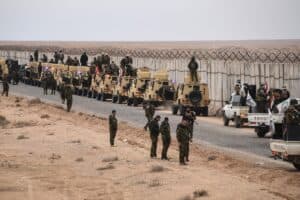More than 1 700 people were killed in March violence along Syria’s Mediterranean coast.

A UN commission investigating sectarian bloodshed in Syria’s Alawite heartland documented systematic violence at the hands of government forces and allied groups, warning Thursday that some of the acts could constitute war crimes.
The violence in March unfolded along Syria’s predominantly Alawite Mediterranean coast, where security personnel and their allies were accused of carrying out summary executions, mostly targeting civilians from the religious minority, with a war monitor saying more than 1 700 people were killed.
The Syrian foreign ministry said it was committed to “incorporating the (commission’s) recommendations into the ongoing process of institution-building” and of consolidating the rule of law.
War crime-like acts
The UN commission said in its report on Thursday that the violence committed by “members of the interim government forces and private individuals operating alongside or in proximity to them… followed a systematic pattern across multiple, widespread locations”.
“The violations included acts that likely amount to war crimes,” it said.
The commission documented cases of “murder, torture and inhumane acts related to the treatment of the dead, widespread looting and burning of homes all of which displaced tens of thousands of civilians”.
Syria’s new authorities have accused gunmen loyal to ousted ruler Bashar al-Assad of instigating the violence by launching deadly attacks that killed dozens of security personnel. The UN commission also found that pro-Assad forces were implicated in the violence.
‘Deeply disturbing’
Human rights groups and international organisations have said entire families were killed, including women, children and the elderly.
ALSO READ: Syrians protest Sweida killings in London, Paris
Gunmen stormed homes and asked residents whether they were Alawite or Sunni before killing or sparing them, they said.
The UN commission documented similar cases involving the killing of Alawite men.
During his rule, Assad — himself an Alawite — cultivated an image as a defender of minorities, even as his authoritarian tendencies plunged the country into civil war.
Since his December ouster at the hands of Islamist-led rebels, the violence on the coast and in south Syria’s Druze heartland have raised questions about the new authorities’ ability to provide security and manage sectarian tensions.
The UN commission — which said it had been granted “unfettered access” to the area by the post-Assad government — based its findings on more than 200 interviews with victims and witnesses.
It said there were “reasonable grounds to believe” that members of the security forces and other private individuals engaged in “serious violations of international human rights law”.
“The scale and brutality of the violence documented in our report is deeply disturbing,” said commission chair Paulo Sergio Pinheiro, urging accountability and expanded efforts to arrest perpetrators.
ALSO READ: New Syria PM says all religious groups’ rights ‘guaranteed’
‘Serious note’
The commission said it “continues to receive information about ongoing violations in many of the affected areas, including abductions of women, arbitrary arrests and enforced disappearances”.
It said it had “found no evidence of a governmental policy or plan” to carry out the attacks, though their systematic nature “in certain locations may be indicative of an organisational policy within certain factions or groups”.
In a letter to the commission, Foreign Minister Asaad al-Shaibani said the government took “serious note of the alleged violations”, saying they “appear to be consistent with the findings” of the Syrian inquiry.
US envoy for Syria Thomas Barrack called the report “a serious step towards definable and traceable metrics to the Syrian government’s responsibility, transparency and accountability”.
Investigations into recent violence
The commission said it was also investigating recent violence in Syria’s Druze-majority Sweida province that it said highlighted the urgency of implementing the report’s recommendations.
In its own inquiry, the committee formed by the Syrian authorities documented “serious violations against civilians” in March.
The committee confirmed “the names of 1 426 dead, including 90 women”, and identified “298 individuals by name” who were suspected of involvement in the violations.
NOW READ: ‘Tread carefully’: What fall of Assad regime in Syria means for SA






